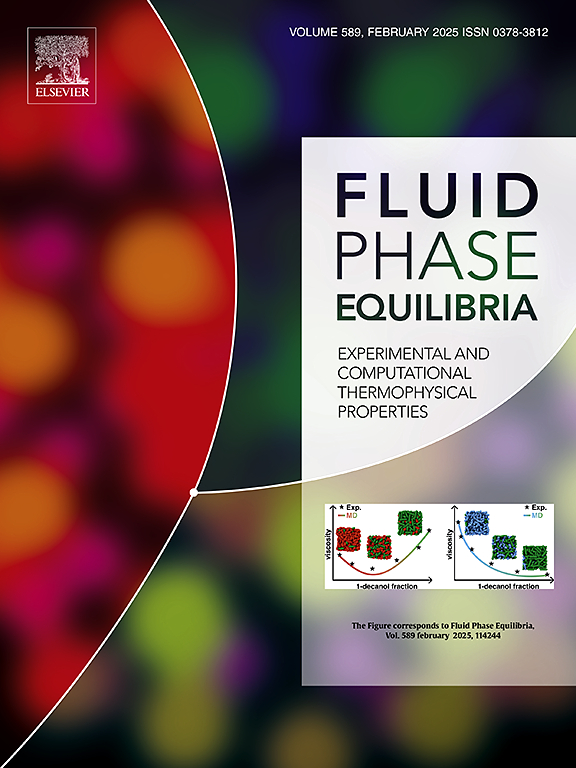Prediction of pharmaceutical solubility in mixed-solvents with a local composition-quantum energy parameter model
IF 2.7
3区 工程技术
Q3 CHEMISTRY, PHYSICAL
引用次数: 0
Abstract
Theoretical approaches for estimating pharmaceutical solubility in solvents can reduce experimental effort for optimizing design of separation and purification steps. In this work, an approach is developed for solvent selection of pharmaceuticals that is based on geometric energy difference (GED), determined from interaction energies via density functional theory and time dependent density functional theory calculations. Interaction energies were optimized through surface charge density predictions at the aug-cc-pvdz/blyp level of theory, with computational efficiency enhanced via machine learning. Comparison between GED and Hansen solubility parameter (HSP) approaches for solvent selection revealed that the GED approach was more selective than the HSP relative energy difference solubility sphere approach. An activity coefficient model was developed to predict pharmaceutical solubility in mixed-solvents based on local composition theory and optimization of quantum energy parameters (LC-QEP model). For 41 pharmaceutical-mixed-solvent systems, the LC-QEP model predicted API solubility to within an average relative deviation logarithm (ARDln) of 0.669, compared with an ARDln of 1.755 for the RST model based on HSP. The LC-QEP model was compared with other molecular-based models for prediction of API solubility. For naproxen- and paracetamol- mixed-solvent systems, average ARDln values for the LC-QEP model (0.117) were lower than those of the PC-SAFT equation of state model (0.369). For the vanillin-water-ethanol system, average ARDln values were lower for the LC-QEP model (0.137) than the COSMO-RS model (ARDln=0.294). For the aspirin-methylcyclohexane-ethanol system, average ARDln values of the PC-SAFT equation of state based on COSMO (0.102) were lower than those of the LC-QEP model (0.153) which may be attributed to weak interactions being over-estimated by the LC-QEP model. The GED approach can be used to reliably select solvents for pharmaceuticals and the LC-QEP model is able to predict API solubilities in mixed-solvent systems with lower deviations than several predictive models.
用局部成分-量子能量参数模型预测药物在混合溶剂中的溶解度
估计药物在溶剂中的溶解度的理论方法可以减少优化分离和纯化步骤设计的实验努力。在这项工作中,开发了一种基于几何能量差(GED)的药物溶剂选择方法,该方法通过密度泛函理论和时间相关密度泛函理论计算从相互作用能确定。通过理论层面的aug-cc-pvdz/blyp表面电荷密度预测优化相互作用能,并通过机器学习提高计算效率。比较GED和Hansen溶解度参数(HSP)方法对溶剂选择的影响,发现GED方法比HSP相对能差溶解度球法更具选择性。基于局部组成理论和量子能量参数优化,建立了预测药物在混合溶剂中溶解度的活度系数模型(LC-QEP模型)。对于41个药物混合溶剂体系,LC-QEP模型预测API溶解度的平均相对偏差对数(ARDln)为0.669,而基于HSP的RST模型的ARDln为1.755。LC-QEP模型与其他基于分子的API溶解度预测模型进行了比较。对于萘普生和扑热息痛混合溶剂体系,LC-QEP模型的平均ARDln值(0.117)低于PC-SAFT状态方程模型的平均值(0.369)。对于香草-水-乙醇体系,LC-QEP模型的平均ARDln值(0.137)低于cosmos - rs模型(ARDln=0.294)。对于阿司匹林-甲基环己烷-乙醇体系,基于COSMO的PC-SAFT状态方程的平均ARDln值(0.102)低于LC-QEP模型的平均ARDln值(0.153),这可能是由于LC-QEP模型高估了弱相互作用。GED方法可用于可靠地选择药物溶剂,LC-QEP模型能够预测混合溶剂系统中的API溶解度,比几种预测模型的偏差更小。
本文章由计算机程序翻译,如有差异,请以英文原文为准。
求助全文
约1分钟内获得全文
求助全文
来源期刊

Fluid Phase Equilibria
工程技术-工程:化工
CiteScore
5.30
自引率
15.40%
发文量
223
审稿时长
53 days
期刊介绍:
Fluid Phase Equilibria publishes high-quality papers dealing with experimental, theoretical, and applied research related to equilibrium and transport properties of fluids, solids, and interfaces. Subjects of interest include physical/phase and chemical equilibria; equilibrium and nonequilibrium thermophysical properties; fundamental thermodynamic relations; and stability. The systems central to the journal include pure substances and mixtures of organic and inorganic materials, including polymers, biochemicals, and surfactants with sufficient characterization of composition and purity for the results to be reproduced. Alloys are of interest only when thermodynamic studies are included, purely material studies will not be considered. In all cases, authors are expected to provide physical or chemical interpretations of the results.
Experimental research can include measurements under all conditions of temperature, pressure, and composition, including critical and supercritical. Measurements are to be associated with systems and conditions of fundamental or applied interest, and may not be only a collection of routine data, such as physical property or solubility measurements at limited pressures and temperatures close to ambient, or surfactant studies focussed strictly on micellisation or micelle structure. Papers reporting common data must be accompanied by new physical insights and/or contemporary or new theory or techniques.
 求助内容:
求助内容: 应助结果提醒方式:
应助结果提醒方式:


